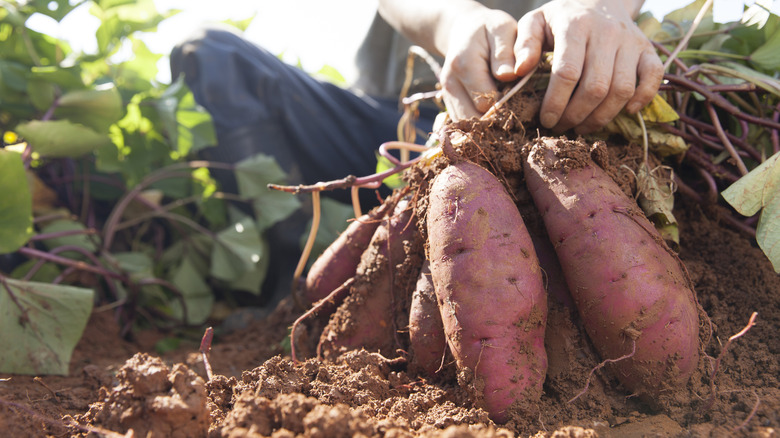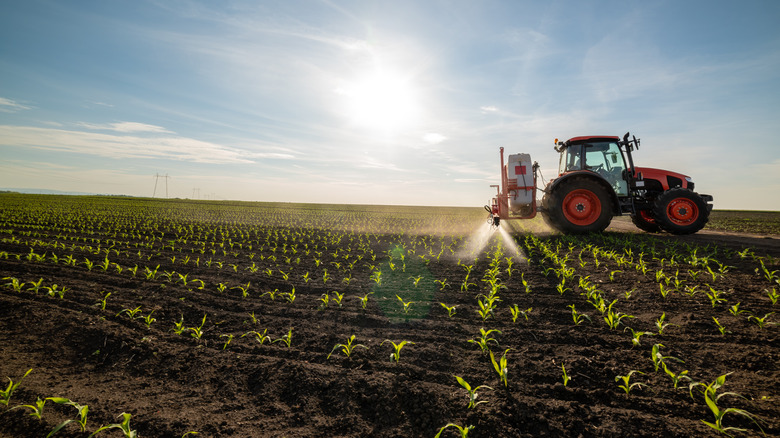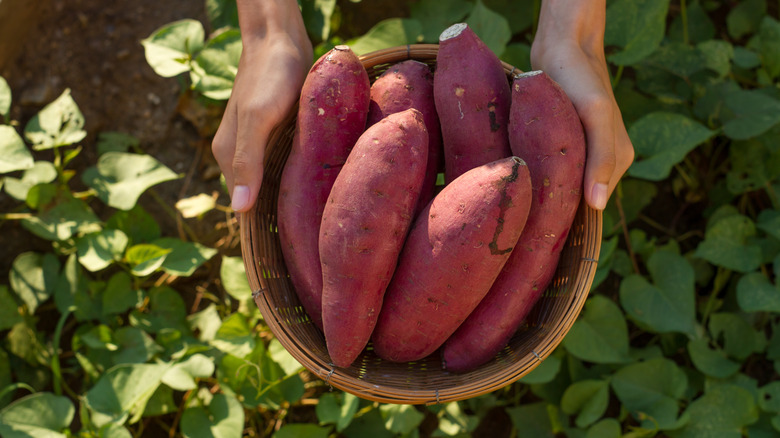Sweet Potatoes Are The Nutrient Powerhouse To Join The 'Clean 15' Ranks
While eating clean is always a good idea, every food has its drawbacks — even the most natural food: produce. One of the biggest concerns associated with the fruits and vegetables that spurt up out of the ground is the presence of pesticides. While we can't usually see harmful chemicals, they significantly impact our health and the environment. From rashes and nausea to more significant problems like cancer and congenital disabilities, pesticides are nothing to scoff at, and it's one of the biggest reasons you should always ensure.
If you want to avoid ingesting pesticides as much as possible, scientists have examined which produce types would be more and less likely to pick up pesticides. The most unsavory of the bunch is known as the Dirty Dozen, while other cleaner fruits and veggies make up the Clean 15. This year, one nutrient powerhouse began climbing the ranks of the Clean 15. So if you need another reason to make sweet potato fries with dinner, here's one.
Breaking down the Dirty Dozen and the Clean 15
While it's easy to say some fruits and veggies are generally safer to eat than others, how is it determined? A lot of data goes into determining the Clean 15 and Dirty Dozen lists. Every year, researchers and food scientists from the U.S. Department of Agriculture collect samples of thousands of common fruits and vegetables from grocery store shelves to test for upward of 250 different types of pesticides. Scientists will wash the fruit as shoppers would at home and then test the product for any traces of pesticides. Based on the results, the two lists are built.
While some of the data from these studies can be alarming, other bits are promising, and each test provides consumers with a clearer picture of what they're actually ingesting. According to CNN Health, strawberries and peaches contained the most pesticides in this year's report, with the study detecting 210 different types. In contrast, upward of 65% of the produce on the clean 15 list contained no trace of pesticides at all. (Corn and avocado topped that list if you're curious). While many types of produce on both lists have been repeat offenders, sweet potatoes only recently joined the ranks of the Clean 15.
The sweet potato's spot on the Clean 15
If you're a big fan of sweet potatoes, this one's for you. The popular root vegetable has joined the ranks of the Clean 15 for the second year in a row — and its place on the list has risen. While sweet potatoes came in last on the list in 2022, they've now jumped up two spots to No. 13, beating out watermelon and carrots.
That's just one more positive to add to sweet potatoes' long list of benefits. From its high levels of fiber and antioxidants for gut health to its support of healthy brain function, there's already a lot to love about the vegetable. If you want to avoid the harmful effects of pesticides, consider adding more sweet potatoes to your diet. (Or any produce off the Clean 15 list, for that matter). And when in doubt, try buying organic. Produce in this category is known for carrying lower levels of pesticides — just like members of the Clean 15.


